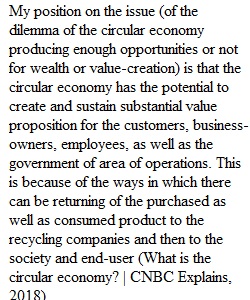


Q 1. Watch the video on circular economy 2. The dilemma of two often contradictory requirements when it comes to sustainability in corporate social responsibility plans is (Deresky, 2014): 1. Selling at low prices. 2. Being environmentally and socially conscious. Competitive pressures limit the company's ability to raise prices in order to cover the cost of socially responsible policies. Obviously, these are contradictory to the well- being of societies (Deresky, 2014). Advocates of CSR view it as a "wealth creating opportunity," which may attract idealistic employees and new customers, and increases the potential for decreased capital cost (Vermaelen, 2011). On the other hand, critics of CSR view it as a form of taxation that may reduce the "value-creation process of capital" (p. 1). What is your position on this issue? Support your position with research. Deresky, H. (2014). International management: Managing across borders and cultures (8th ed.). Upper Saddle River NJ: Pearson Vermaelen, J. (2011). An innovative approach to funding CSR projects. Retrieved from www.hbr.org
View Related Questions